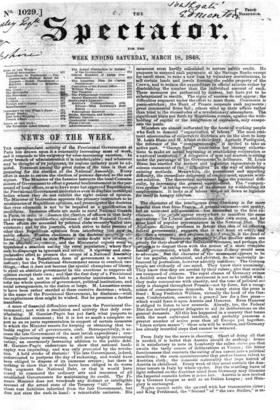NEWS OF THE WEEK.
THE superabundant activity of the Provisional Government at Paris has drawn upon it a constantly increasing mass of work, and it responds to the exigency by ever-increasing exertion. In every branch of administration it is indefatigable; and whatever may be thought of its judgment, its zealous industry must be ad- mired. Foremost among the great duties of the time is that of preparing for the election of the National' Assembly. Every effort is made to secure the election of persons devoted to the new regime. The Minister of the Interior instructs the local Commis- sioners of Government to effect a general bouleversement in the per- sonnel of local offices, so as to have none but approved Republicans: the Provisional Government undertakes even to displice municipal bodies where they do not exhibit the right colour of opinion. The Minister of Instruction appoints the primary instructors to be missionaries of Republican opinions, and promulgated-the doctrine that even education is not to be required as a qualification in candidates. Immense efforts are made to enrol Natinual Guards in Paris, in order to .iinence the ,lectiort of officers in'that body and swamp the middle-chr,s opinions o..f the old National Guard, These efforts are seconded by political clubs recently ailed into existence ; and by the journals, which strive to deter persons of other than Reputlican opinions from interfering just ring iu public affairs. Tusive obedience is the doctrine ge•-; cr- forced. to rule ftance : some doubt now ovains to its ablaoluti ist.4-:aimeay,, and the Ministerial organs seem to apprehend a reaction amang the rural population ; whom they seek to disparage as ignorant and servile. A vigorous and com- prehentive effort to procure the return of a National Assembly favourable to a Republican form of government is a natural instinct ; but the Provisional Government seems to overlook two things,—that it does not become the special champions of liberty to excel an absolute government in' the exertions to suppress all opinion except their own ; and that the first duty of a Provisional Government is, not to establish particular institutions, but to refer the whole question of government, political institutions, and social arrangements, to the nation at large. M. Lamartine seems to have been rather startled at these coercive doctrines ; which, in the name of the Provisional Government, he disclaims—with less explicitness than might be wished. But he promises a further manifesto.
A mass of financial difficulties crowd upon the Provisional Go- vernment; met with a resolution and activity that defy over- whelming. M. Garnier-Pages has put forth what purports to be a financial statement ; but it is not so much a complete re- port as an ex parte representation in support of certain measures to which the Minister resorts for keeping or obtaining that va- luable engine of all governments, cash. Retrospectively, it ac- cuses the late Government of the most lavish expenditure ; con- tinually-increasing money-votes, a still more largely increasing outlay, an enormously increasing addition to the public debt. M. Gamier-Pages endeavours to show that national bank- ruptcy was impending, and was only prevented by the revolu- tion. A bold" stroke of rhetoric! The late Government, indeed, endeavoured to postpone the day of reckoning, and would have been obliged to dispose of its immense arrears ; but there is nothing to show that it would have been obliged to do worse than augment the National Debt, or that it would have ceased to command the ordinary arts and resources of all established Governments for maintaining its credit. The Fi- nance Minister does not vouchsafe any distinct or intelligible account of the actual state of the Treasury " till." He dis- closes vast liabilities inherited from the late Government, but does not state the cash in hand: a remarkable' omission. His measures seem hardly calculated to restore pdhlic credit. He proposes to suspend cash payments at the Savings Banks except for small sums, to raise a new loan by voluntary contributions, to sell certain lands and jewels forming-the public property of the Crown, and to reduce the expenditure in official salaries rather by diminishing the number than the individual amount of each. These measures are authorized by decrees, but have yet to be substantiated in results. The signs of success do not appear ; the difficulties augment under the effort to meet them. Commerce is panic-stricken ; the Bank of France suspends cash payments ; great commercial firms fail ; others wind up their affairs rather than trust to the vicissitudes of a revolutionary atmosphere. The significant hints put forth by Republican writers, against the with- holding of capital or the emigration of capitalists, only exaspe- rate the panic. Ministers are almost suffocated by the hosts of working people who flock to demand "organization of labour." The most emi- nent missionaries of cooperative doctrines are on the alert to keep M. Louis Blanc and M. Albert at their duty. Agricole Perdiguier, the reformer of the " eompagnonnage," is invited to take an active part. " George Sand' contributes her literary exhorta- tions to make an actual beginning in establishing cooperation as a national institutiOn'Y .ti delegation of men and masters is sittinif under the patrontige •ortheGoverament,to deliberate. M. Louis Blanc has startled the earnest and iinlaatient regenerators by a solemn statement of the " diaeulties " "art the way of abolishing existing methods. Meanwhile, the paramount and -appalling difficulty) the immediate deficiency of em loyment, appears with- out solution. The theoretical movement the practical diffi- culty, by increasing the general unsettle' ent. 'Me "competi- tive system" is taking revenge of its censors by withholding its employments. It looka as if labour viouid.sit down to legislate for itself in hungry idleess.


























